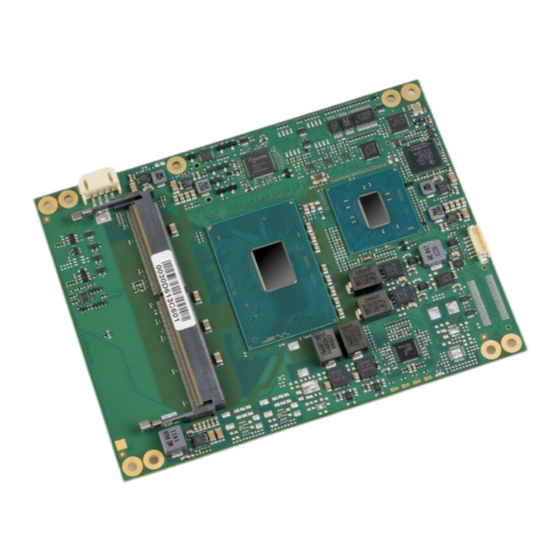Avnet MSC C6B-CFLH Petunjuk Pemasangan - Halaman 4
Jelajahi secara online atau unduh pdf Petunjuk Pemasangan untuk Unit Kontrol Avnet MSC C6B-CFLH. Avnet MSC C6B-CFLH 4 halaman. Com express basic module. heat spreader

MSC C6B-SLH / KLH / CFLH / CFLR
Heat spreader mounting instructions
Step 1: Insert the memory module into the top memory socket. Make sure it is inserted correctly!
Note: When using only one memory module, insert it into the socket on the topside of the module.
Step 2: Place the printed circuit board onto the heat spreader and fix it by tightening the four screws in
the sequence 1 to 4 as shown below.
NOTE: The recommended screw tightening torque with a PH1 screwdriver is 0.4 Nm.
Step 3: Insert the memory module into the bottom memory socket if necessary.
Step 4: Mount the MSC C6B-SLH/KLH/CFLH/CFLR module on the baseboard and fix it securely with
adequate screws through the five mounting holes as defined in the COM Express Module Base
Specification. Please note that these screws are not provided in the delivery because there are different
mechanical implementation options like stacking height of COM Express receptacles on the customers'
carrier board.
There are two versions of heat spreaders in order to satisfy different mounting options needs, when
assembling module, heat spreader and baseboard.
On the C6B-SLH-01 HSP the five intended standoffs incorporate 2.7 mm though holes for screwing
through the top side of the heat spreader. On the C6B-SLH-02 HSP these standoffs incorporate M2.5
threads form screwing though the bottom side of the baseboard.
NOTE: The recommended screw tightening torque with a PH1 screwdriver is 0.4 Nm. It is also
recommended to use the full thread depth inside the standoffs (11mm).
NOTE:
The grey heat conducting pad is phase change material and intended for one-time mounting only. If you
need to remove the heat spreader for service purposes and want to reuse it, the wax-like material must
be spread over the full die surface before re-mounting the heat spreader (see above, paragraph 2).
4 / 4
